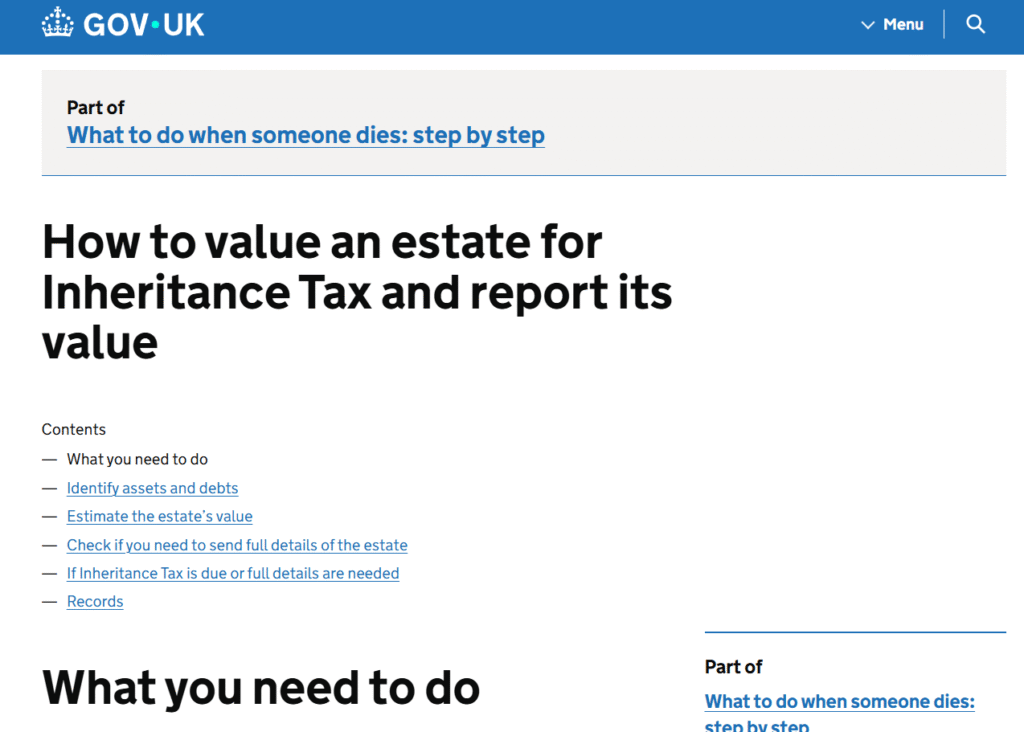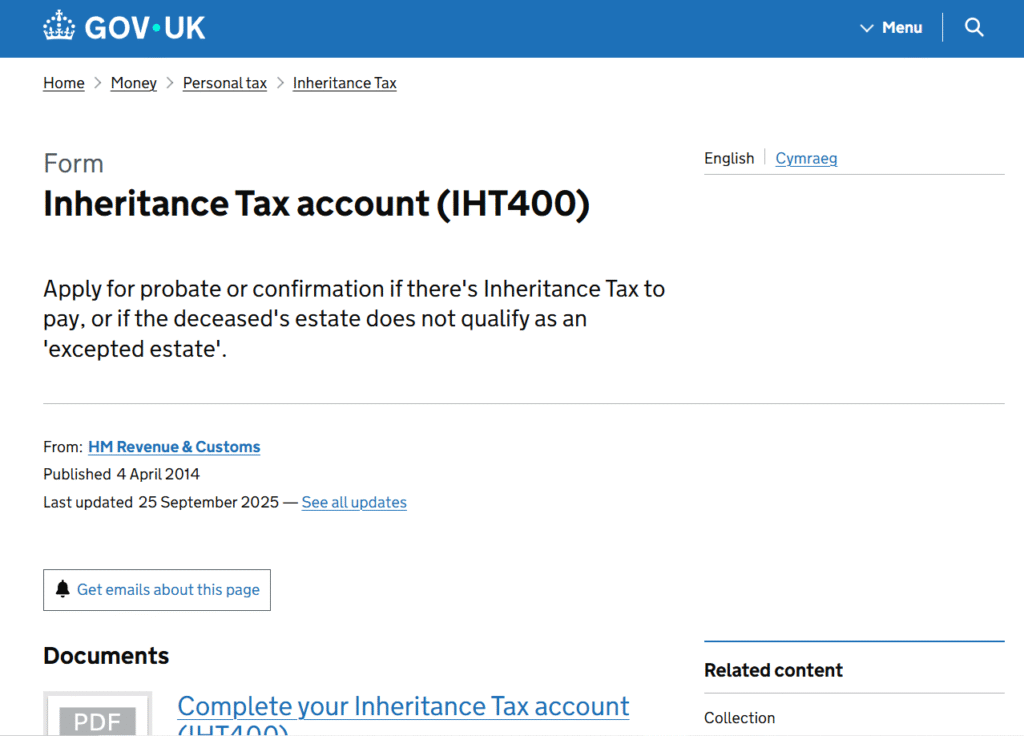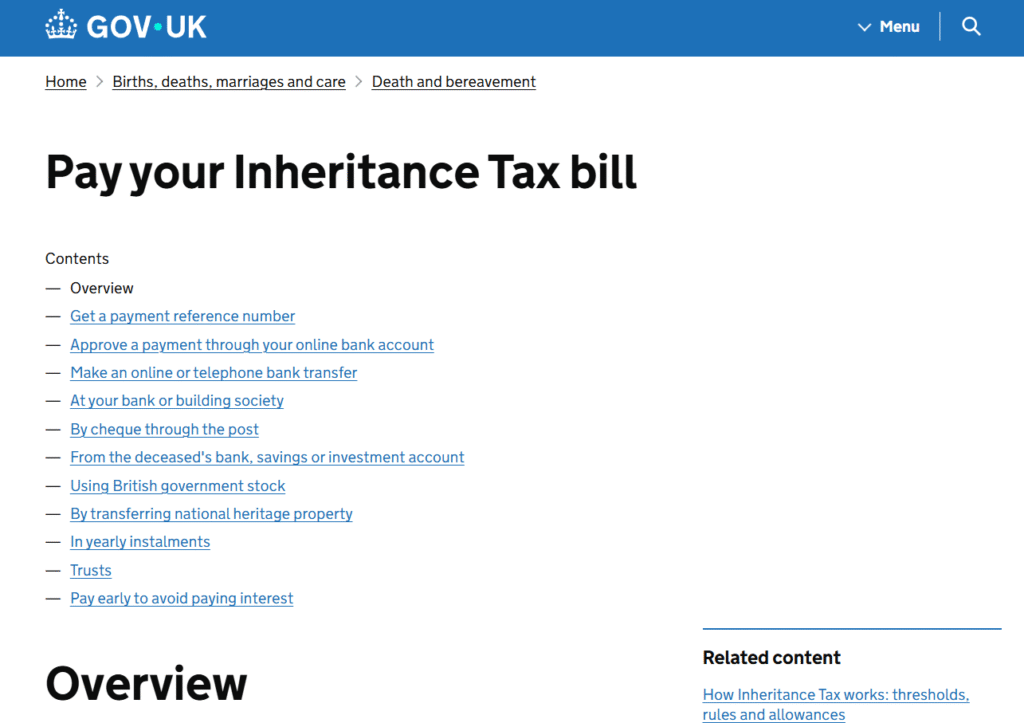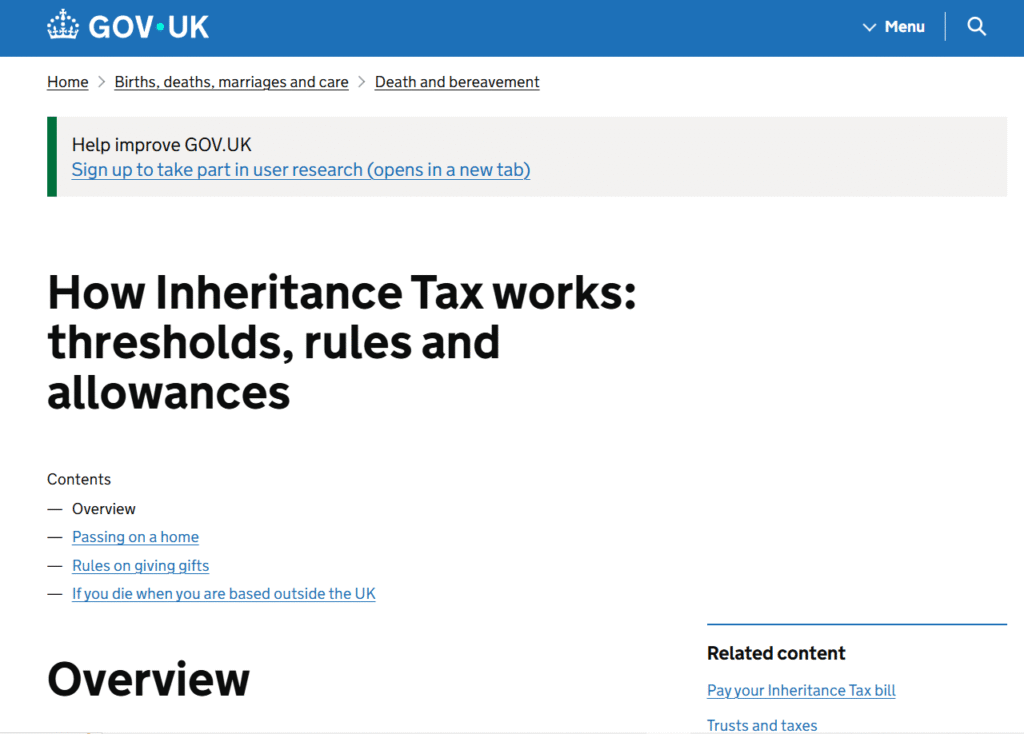Inheritance Tax (IHT) – Full Guide to UK Inheritance Tax, IHT Allowances, Thresholds, Forms & How to Report to HMRC
What Is Inheritance Tax (IHT)?
Inheritance Tax (IHT) is a tax applied in the UK on the estate (property, money, and possessions) of someone who has died. Although often misunderstood as a tax most families will pay, in reality less than 4% of estates pay inheritance tax — mainly due to available allowances, reliefs, and exemptions.
However, when IHT is due, the process can be stressful, time-consuming, and filled with complicated forms such as:
-
IHT205 – Return of Estate Information (for excepted estates)
-
IHT400 – Main Inheritance Tax Account (for taxable or complex estates)
-
IHT421 – Probate Summary
-
IHT435 – Residence Nil Rate Band claim
-
IHT436 – Transferable RNRB
-
IHT402 – Transferable Nil Rate Band
-
IHT403 – Gifts and lifetime transfers
-
IHT404 – Jointly owned assets
-
IHT412 – Pension details
-
IHT500 – Filing return and paying by instalments
This guide explains everything — from what IHT is, how it’s calculated, which forms you need, how to complete them, and how Audit Consulting Group can support families through the process.
Need help with inheritance tax reporting? ACG provides comprehensive support for Inheritance Tax Planning, ensuring optimal tax structuring both before and after death.
When Is Inheritance Tax Paid?
IHT is normally paid when:
-
The total estate value exceeds the Nil Rate Band (NRB)
-
Certain gifts were given within 7 years before death
-
Trusts are involved
-
Overseas assets are included
-
Property prices push estate above thresholds
-
Complex ownership arrangements exist
The standard IHT threshold (Nil Rate Band) is:
£325,000
If the estate is worth less than £325,000, no IHT is normally due.
When IHT Is NOT Paid
No IHT is due when:
– The estate is worth less than £325,000
– Everything is left to a spouse or civil partner
– Everything is left to a charity
– The deceased lived permanently abroad and was not UK-domiciled (special rules apply)
– The estate qualifies as an excepted estate
Further rules:
https://www.gov.uk/valuing-estate-of-someone-who-died
Residence Nil Rate Band (RNRB) – Additional Allowance
Introduced in 2017, the Residence Nil Rate Band (RNRB) allows estates to claim an extra allowance if a home is passed to:
-
Children
-
Step-children
-
Adopted children
-
Foster children
-
Grandchildren
Current RNRB value:
£175,000
This means a married couple could potentially pass on up to £1 million without paying IHT, using:
-
£325,000 NRB × 2
-
£175,000 RNRB × 2
What Is the Inheritance Tax Rate?
Standard IHT rate:
40% on value above thresholds.
Reduced rate:
36% if at least 10% of the estate is left to charity.
Who Pays Inheritance Tax?
The executor or administrator usually pays IHT from the estate.
But IHT can also be due from:
-
Beneficiaries (in special cases)
-
Trustees (if trusts are involved)
-
People receiving lifetime gifts
For gifts, each recipient may need to pay tax if the 7-year rule applies.
Understanding the Main IHT Forms
This is one of the most important sections, because many people do not know which form they need.
IHT205 – For Excepted Estates (No Tax Due)
Used when:
-
Estate value under threshold
-
No complicated assets
-
No overseas property above limits
-
No significant lifetime gifts
IHT205 is used alongside probate applications.
Guidance:
https://www.gov.uk/government/publications/inheritance-tax-return-of-estate-information-iht205
IHT400 – For Taxable or Complex Estates
Used when:
-
IHT is due
-
Estate exceeds £325,000
-
Large gifts within 7 years
-
Trusts exist
-
Overseas property
-
Business or agricultural property
-
Property jointly owned
-
Life insurance not written in trust
IHT400 includes over 20 supplementary forms, depending on estate complexity.
Guidance:
https://www.gov.uk/government/publications/inheritance-tax-inheritance-tax-account-iht400
Download Inheritance Tax account (IHT400)
IHT421 – Probate Summary
This form must be submitted before applying for probate.
HMRC uses it to tell the Probate Registry whether IHT has been paid.
IHT435 & IHT436 – Residence Nil Rate Band
Used to claim:
-
RNRB
-
Transferable RNRB
Essential for maximising allowances.
IHT402 – Transferable Nil Rate Band
Used when a spouse or civil partner died previously and did not use all of their threshold.
Other Relevant IHT Forms
-
IHT403 – Gifts
-
IHT404 – Joint assets
-
IHT406 – Houses & property
-
IHT407 – Household contents
-
IHT410 – Life insurance policies
-
IHT411 – Listed shares & securities
-
IHT412 – Pension
-
IHT500 – Paying instalments
Audit Consulting Group helps complete all forms.
How to Value an Estate for IHT (Step-by-Step)
Correct estate valuation is essential.
Step 1 — Identify all assets
-
Property
-
Bank accounts
-
Investments
-
Vehicles
-
Business interests
-
Insurance policies
-
Crypto assets
-
Personal belongings
Step 2 — Identify all liabilities
-
Mortgage
-
Loans
-
Credit cards
-
HMRC debts
-
Funeral expenses
Step 3 — Calculate gross and net estate
Step 4 — Check gifts in last 7 years
Step 5 — Identify exemptions
-
Spouse exemption
-
Charitable exemption
-
Small gifts
-
Annual allowance
Step 6 — Apply RNRB and transferrable allowances
Step 7 — Determine IHT due
Audit Consulting Group offers complete estate valuation support.
How To Pay Inheritance Tax
Payment deadlines depend on estate assets.
Deadline: 6 months after end of month of death
Payments can be made via:
-
Bank transfer
-
Debit card
-
From life insurance
-
From estate bank account
-
By instalments (IHT500) for property
Guidance:
https://www.gov.uk/paying-inheritance-tax
IHT on Gifts – The 7-Year Rule Explained
IHT may apply to gifts if death occurs within 7 years.
0–3 years: 40%
3–4 years: 32%
4–5 years: 24%
5–6 years: 16%
6–7 years: 8%
After 7 years: 0%
This is known as taper relief.
Trusts and Inheritance Tax
Trusts have their own IHT rules.
They may be subject to:
-
Entry charges
-
10-year anniversary charges
-
Exit charges
Forms required:
-
IHT100
-
IHT100a
-
IHT402 (if deceased spouse allowance applies)
We handle trust IHT reporting.
Common Inheritance Tax Problems
For Families:
-
Difficulty valuing property
-
Missing bank information
-
Unclear gifts
-
Overseas assets
-
Delays from HMRC
-
Incorrect forms submitted
For Executors:
-
Penalties for late submissions
-
Complex supplementary forms
-
Errors in IHT400
-
Cash flow issues
-
Incorrect probate applications
For Beneficiaries:
-
Confusion about tax due
-
Unexpected tax on gifts
-
Incorrect estate distribution
Audit Consulting Group resolves all of these issues.
Case Studies
Case Study 1 – Incorrect Property Valuation
Estate valued home too low. HMRC requested revaluation.
Outcome: We negotiated with HMRC, resolved discrepancy, and avoided penalties.
Case Study 2 – Missed RNRB Claim
Family missed out on £175,000 allowance.
We submitted IHT435 & IHT436 → £70,000 IHT saved.
Case Study 3 – Gift Investigation
HMRC questioned multiple gifts.
We prepared full schedules → HMRC accepted without additional tax.
Case Study 4 – Late IHT Filing
Executor faced penalties.
We negotiated a reduction due to reasonable excuse.
Frequently Asked Questions (FAQ)
Q1: What does IHT stand for?
Inheritance Tax — tax on estates after death.
Q2: Do all estates pay IHT?
No — only around 4% do.
Q3: What is the main IHT threshold?
£325,000 plus potential £175,000 RNRB.
Q4: What is the IHT rate?
40% (or 36% with charitable giving).
Q5: Do I need IHT400 or IHT205?
IHT205 = no tax due
IHT400 = tax due or complex estate
Q6: Do I need probate before paying IHT?
No — tax is paid first to allow probate.
Q7: Can I pay IHT in instalments?
Yes — especially for property.
Official HMRC guidance:
https://www.gov.uk/inheritance-tax
Inheritance Tax HMRC Form Services Cost & Pricing UK
Get professional support with Inheritance Tax HMRC forms in the UK. We assist with IHT calculations, form preparation, and submissions to HMRC. Our affordable IHT services help families manage inheritance tax obligations accurately.
Service Cost Estimation
Select the service category below to calculate the estimated cost of either accounting & tax services or forms and submissions.
Select Required Services / Forms
Select one or more services/forms to receive an accurate cost estimate. You can adjust your selection at any stage.
How would you like to engage our services?
Please select whether you require a one-off service or ongoing monthly support.
Contract Duration
Your cost estimate
Apply now and get 10% OFF
Submit your request today and receive an exclusive 10% discount on your selected service.
All prices are estimates. To receive a personalised quote, please fill out the form or contact us.
Ready to get started?
Get professional support from experienced UK accountants









